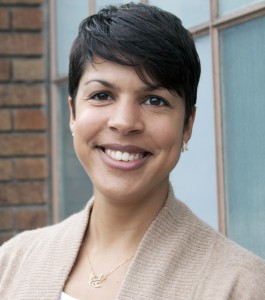
“I am deeply hopeful about the future of the industry,” Catherine Bracy on diversity in Silicon Valley.
Catherine Bracy, Director of International Programs at Code for America, recently presented at the Personal Democracy Forum tech conference (#PDF13) where she examined the stark picture told by data when it comes to representation of women and people of color in Silicon Valley.
Today she is sharing with the Tech Superwomen community why she is optimistic about where we are headed:
What was the focus of your #PDF13 presentation?
I was trying to articulate this phenomenon of isolation I witnessed when I first moved to San Francisco last February. The context was that I was starting the Obama campaign’s technology office here and it also happened to be right when the SOPA/PIPA fight was ending. So I saw techies starting to get engaged–most for the first time–in policy and politics. And I was also dealing with the shock any newcomer to the Bay Area deals with, I imagine, of really ugly social dysfunction and wealth inequality that’s very much in your face.
In the talk I discuss how those experiences got me thinking about the future of the tech industry and the role technologists can play in shaping a more democratic world. I highlighted some pretty depressing statistics about inequality here but I want to stress–I am deeply hopeful about the future of the industry. One thing about being on the ground here is that you get to see the inequality close-up but you also see all the positive indicators too.
What picture do you think the data will paint in five years?
It depends on how hard we’re working. Five years is a lot of time to teach someone how to code. If we’re working to pull more people into the industry, and we’re having honest conversations about why the industry looks the way it does, I think we can make very significant change in five years. We can certainly have put ourselves on a path to a future where 20-30 years from now we’re talking about real equity.
What will drive those changes?
The most important thing is awareness. If all I’m able to do is get people talking, I will see that as a huge accomplishment. But beyond that, I cannot overstate how important the work that organizations like Year Up, Code2040, Black Girls CODE and Girls Who Code are doing. The bridges they’re building between underrepresented communities and the tech industry are extremely important.
One other thing I’d say that I think WON’T drive change is shaming people, putting them on the defensive, and assuming ill will on the part of people who currently hold power in the industry. Most of them either actively want to be a part of the solution or don’t really understand the problem. Alienating them is not going to help.
What role can each of us play in making sure that shift happens?
This one is easy: support organizations like the ones I mentioned above! Black Girls CODE is currently running a campaign to fund 2,000 girls in their summer academy this year — you can donate here. If you’re a programmer, you can also sign up to be a mentor. If you work at a tech company, you can advocate internally to get a Code2040 intern next summer.
The year-over-year growth in the number of companies they’re working with is an indication of how much desire there is within the industry to address these problems. And if you work for an advocacy organization, think about reaching out to technologists to help you do the work you’re doing. As I said in my talk, in my experience many of them are just waiting to be asked. We should be creating as many opportunities as possible to for them to get involved solving real problems.
